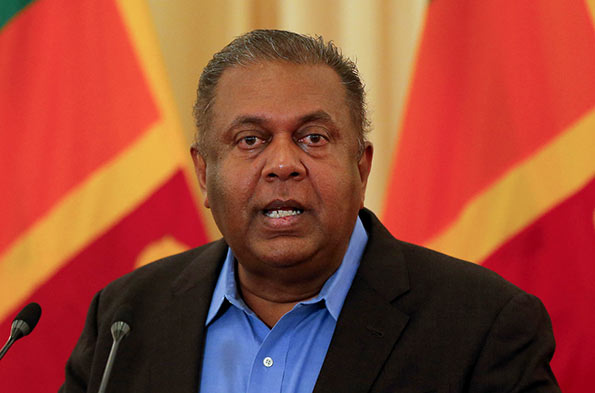Mangala slams Rajapaksa on missing persons cases

Sri Lanka’s foreign minister has said that former president Mahinda Rajapaksa’s government failed to investigate cases of people who went missing during the three-decade civil war.
Mangala Samaraweera in his statement accused Rajapaksa of going back on an agreement he had with the UN soon after the war with the LTTE ended in 2009.
“This was also evident when he and UN Secretary-General Ban Ki-moon agreed to an accountability process in their 2009 Joint Communique, which was later made into a formal commitment to the international community,” Samaraweera said.
Rajapaksa had claimed that the current government was betraying the country’s security forces through the legislation on the Office of Missing Persons (OMP) to probe the cases of missing people.
“It is your failure to investigate these allegations and if they are true punish the few miscreants in high positions who may have acted unprofessionally and thereby clear the name of the armed forces as an institution, that is the true betrayal of the armed forces,” Samaraweera said.
The OMP is a truth-seeking investigative agency and it does not make judgements on disputes, he said.
In fact, the legislation states that “the findings of the OMP shall not give rise to any criminal or civil liability,” he said.
Its primary function is to establish whether a missing person is dead or alive and, if they are dead, discover when, how and where they died. The OMP will require technical expertise that is not available in Sri Lanka, Samaraweera argued.
“Any Sri Lankan citizen going missing is a tragedy. It is the government’s duty to investigate and determine the fate of any of its citizens who are missing,” he said.
The purpose of having an exclusion of the Right of Information Act is to ensure that those who know the fate of missing or disappeared persons can transmit that information without fear.
The OMP is a mechanism designed to discover the truth of a missing person’s fate and not act as a prosecutorial or judicial body, he said.
(PTI)
Latest Headlines in Sri Lanka
- Dr. A.T. Ariyaratne passes away April 16, 2024
- Palitha Thewarapperuma passes away April 16, 2024
- Sri Lanka debt restructuring stumbles as government rejects bondholders’ proposal April 16, 2024
- Sri Lanka must stay neutral in world conflicts – Harshana Rajakaruna April 16, 2024
- Sri Lanka commences IMF-World Bank Spring Meetings with positive bilateral talks April 16, 2024



Let’s begin with 88-89 period, there were hundreds and thousands of people went missing.
First show an example to them. Begin with it.
Dear Niyama Sinhalaya, Thank you so much for your ‘Niyama’ reply. Yes, during 88-89 period thousands went missing. Thousands murdered by then UNP government. Not a single so called Human right movement worried about this. I am still wondering why????
The Budget
The Balance of Payments
Pada Yatra
Yahpalana Yatra
Central Bank Adiminstrtion
EPF and the ETF
National Savings Bank missing depositors
Dead from the Tsunami
Dead from the Hurricane and landslide in June
Blow, blow, thou winter wind,
Thou art not so unkind
As man’s ingratitude;
Thy tooth is not so keen,
Because thou art not seen,
Although thy breath be rude.
Heigh-ho! sing, heigh-ho! unto the green holly:
Most friendship is feigning, most loving mere folly:
Then, heigh-ho, the holly!
This life is most jolly.
as you like it …..shakespeare
Did Americans and NATO bothered to count deaths during Iraq campaign and after, during it was under their control? Have you ecer heard or read how the NGO ‘Iraq Body Count’ came into existence?
SL is a third world country suffered decades from the LTTE terrorism, destroying national wealth, by the time MR came to power. After the war the primary task was developing the country and put the infrastructure in place, not finding missing persons. There are things called national priorities.
Dear Indra, Yes, the present YP government doesn’t understand the priorities and they themselves do not have priorities. They came to power on 8 January 2015 and still their priority is Mahinda bashing and using FCID to arrest political opppnanants and releasing them. This is a continuous process. Hon Foreign Minister says Sri Lanka lacks capacity to man the OMP. This means he is allowing foreign elemants to come and work for OMP office. He doesn’t know that he can tap local knowledge in ‘ANJANAM’ aged old technology.
I wonder if development of the Hambantota Harbour, the Mattala Airport, the motorway to the South, the Port City and the glimmering stone paved sidewalks in Colombo are all national priorities?
They bring zero revenue to the Government; now we, the amude-wearing taxpayers, are paying 95% of Government Revenue to service loans obtained for this dead infrastructure.
National priorities indeed; self-aggrandisement clothed as development !!
“I wonder if development of the Hambantota Harbour, the Mattala Airport, the motorway to the South, the Port City and the glimmering stone paved sidewalks in Colombo are all national priorities?”
Yes! Yes! Yes! Sri Lanka has no future in the world as a manufacturing nation, but a services provider. Specially tourism sector and shipping sector for its strategic location . The tourism data since the end of the LTTE mayhem will speak for itself. In the hand of the people those who have no knowledge, vision and only hell-bend on erasing what MR has done, all those things has become a loss. A country whose wealth was drained and destroyed by a 30 years civil war cannot compete with the rest of the world without heavy borrowing, a carefully thought out solid plan and adhering to that plan. What else has happened to date in SL since MR’s departure, but stopping and re-starting his government plans? Singapore, Malaysia, Thailand did not develop by placing and worshipping ‘democracy at any cost industry’. They had leaders and continuity.